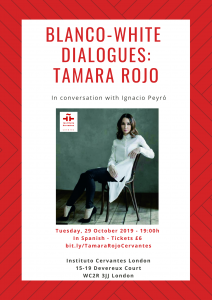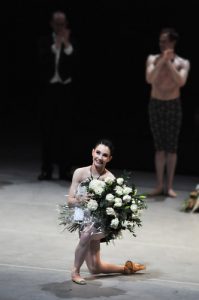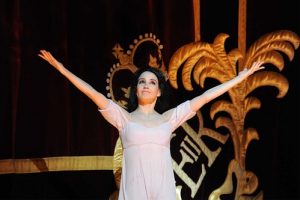Juan Luis Cebrián recalls Spanish Transition at Cervantes London

Spanish journalist and writer Juan Luis Cebrián reviewed the Spanish Transition and his role in the newspaper El País since its foundation in 1976. The interview is among the new series of the White-White Dialogues, in a conversation with the director of Instituto Cervantes London, Ignacio Peyró.
Current Honorary President of El País, the newspaper with the greatest dissemination and prestige in Spanish today. He is also part of the PRISA information, education and entertainment group, Cebrián (Madrid, 1944) and was executive chairman of the parent company until January 2018.During the interview, Peyró highlighted how “We are all witnesses of History, but only a few have the opportunity to decisively contribute towards shaping it” in reference to Cebrián. He is considered to have left a “greater footprint” on the last century of Spanish public life, in part due to how he co-founded Cuadernos para el Diálogo in the 60s.

Dazzled by Fleet Street
London has been important in his life. First, as a young man dazzled by the journalistic atmosphere that was breathing in the streets around Fleet Street and the eternal image of England, at that time complete with shillings. It was – in fact – here that he wrote one of his first journalistic scoops: an interview with Spanish politician Manuel Fraga, in which he is seen wearing a bowler hat across Hyde Park.
Cebrián also lived here during the entrance of the United Kingdom in what was then called the European Common Market. Back then, he spent almost a month writing reports and interviewing many people. By chance, he was also here on the night of the victory of the Brexit referendum, where, also by chance, he met Boris Johnson.

Impressed by Margaret Thatcher and Fidel Castro
“One of the privileges that I have had in my life for dedicating myself to journalism has been to meet many Heads of State. Some very interesting, such as Margaret Thatcher and Fidel Castro, who I always say are the two politicians who have personally impressed me the most, as they used to say the same in public that they said in private, a very rare thing in a politician,” added Cebrián.
El País is a newspaper which maintained a strong intellectual vocation from the beginning, with Rafael Conte, for example, as a literary critic, and intellectuals such as Jesús Aguirre or Francisco Ayala, who contributed to marking the intellectual fervour of the newspaper. Cebrián acknowledged that he had the privilege of being a great friend of the writer Gabriel García Márquez and took many trips with him. His friends also include Juan Goytisolo, whom he defined as one of the most unknown characters in Spanish culture, alongside writers like Carlos Fuentes and Mario Vargas Llosa.
Member of the Spanish Royal Language Academy since 1996 and member of the Conseil de Surveillance du Monde, Cebrián studied Philosophy at Complutense University in Madrid, where he graduated in Information Sciences, after graduating from the Official School of Journalism (1963).

Gabriele Finaldi, next guest of the Blanco-White Dialogues
The director of the National Gallery, Gabriele Finaldi, will be the next guest of the Blanco-White dialogues on March 18th. Prior to Cebrián, the dialogues at Instituto Cervantes London were attended by chef José Pizarro; writer Eduardo Mendoza; and dancer and director of the English National Ballet, Tamara Rojo.
The Blanco-White Dialogues bring great characters related to Spanish culture and relations between Britain and Spain to the British public. In a relaxed environment, prone to confidences, the guests have an in-depth conversation and are open to the public.

Juan Luis Cebrián rememora la Transición española en el Cervantes de Londres

El periodista y escritor español Juan Luis Cebrián repasó la Transición española y el papel del diario El País, desde su fundación en 1976, durante su participación en un encuentro de la nueva serie de Diálogos Blanco-White, en una conversación con el director del Instituto Cervantes de Londres, Ignacio Peyró.
Actual presidente de honor de El País, que hoy es el diario de mayor difusión y prestigio en español y que forma parte del grupo de información, educación y entretenimiento PRISA, Cebrián (Madrid, 1944) fue presidente ejecutivo de la compañía matriz hasta enero de 2018.
Peyró, destacó cómo “a todos nos toca ser testigos de la historia, pero solo unas pocas personas tienen la oportunidad de contribuir de modo decidido a modelarla” en referencia a Cebrián, uno de los hombres que considera que “mayor huella” ha dejado en el último siglo de vida pública española, desde que allá en los años 60 cofundara Cuadernos para el Diálogo.

Deslumbrado por Fleet Street
Londres ha sido uno de los lugares de su vida. Primero, como un joven deslumbrado por el ambiente periodístico que se respiraba en las calles alrededor de Fleet Street y la Inglaterra eterna que aún contaba en chelines. Fue aquí donde escribió uno de sus primeros bombazos periodísticos: una entrevista a Manuel Fraga, en la que se le ve con bombín cruzando Hyde Park.
Aquí vivió también Cebrián la entrada del Reino Unido en lo que era entonces el Mercado Común Europeo, ya que se pasó casi un mes haciendo reportajes y entrevistando a mucha gente. Por pura casualidad también pasó aquí la noche de la victoria del referéndum del Brexit, donde, también de casualidad, se encontró con Boris Johnson.

Impresionado por Margaret Thatcher y Fidel Castro
“Uno de los privilegios que he tenido en la vida por dedicarme al periodismo ha sido conocer a muchos Jefes de Estado, algunos muy interesantes como Margaret Thatcher y Fidel Castro, que siempre digo que son los dos políticos más me han impresionado personalmente, diciendo lo mismo en público que decían en privado, cosa muy rara en un político”, exclamó Cebrián.
Con El País se quiso un diario con fuerte vocación intelectual desde el principio, con Rafael Conte, por ejemplo, como crítico literario, y personajes como Jesús Aguirre o Francisco Ayala, que contribuyeron a marcar la temperatura intelectual del periódico. Reconoció que tuvo el privilegio de ser gran amigo de Gabriel García Márquez y de hacer muchos viajes con él; muy amigo de Juan Goytisolo, al que definió como uno de los personajes más desconocidos de la cultura española; y muy amigo de escritores como Carlos Fuentes y Mario Vargas Llosa.
Académico de la Lengua desde 1996 y miembro del Conseil de Surveillance de Le Monde, Cebrián estudió Filosofía en la Universidad Complutense de Madrid, donde se licenció en Ciencias de la Información, tras graduarse en la Escuela Oficial de Periodismo (1963).

Gabriele Finaldi, próximo invitado de los Diálogos Blanco-White
El director de la National Gallery, Gabriele Finaldi, será el próximo invitado de los diálogos Blanco-White el 18 de marzo. Anteriormente a Cebrián, los diálogos en el Instituto Cervantes de Londres contaron con la presencia del chef José Pizarro; el escritor Eduardo Mendoza; y la bailarina y directora del English National Ballet, Tamara Rojo.
Los Diálogos Blanco-White acercan al público británico a grandes personajes relacionados con la cultura española y las relaciones entre Gran Bretaña y España. En un ambiente distendido y relajado, propenso a las confidencias, los invitados mantienen una conversación en profundidad y abierta al público.

Tamara Rojo launches the new White-White Dialogues at Instituto Cervantes in London

The new series of White-White Dialogues will feature an exceptional guest, the dancer and English National Ballet director, Tamara Rojo, next Tuesday, October 29 at 7:00 pm, in a conversation with director of Instituto Cervantes in London, Ignacio Peyró.
The prestigious dancer will review her incredible artistic career and talk about the world of dance, her sacrifices and her successes, and the career of a Spanish woman who has triumphed in Britain, in an event that will be held in Spanish language.

The White-White Dialogues bring great characters related to Spanish culture as well as Anglo-Spanish relations between to the British public. In an informal and relaxed environment, Rojo, opens this new format with an in-depth conversation with the public as though they were her close confidants.
Peyró highlights the relevance of these dialogues to deepen the ties that unite both countries, in a cycle that in the coming months will also feature the presence of writer and 2016 Miguel de Cervantes Literature Prize, Eduardo Mendoza, chef Jose Pizarro and journalist, writer and businessman Juan Luis Cebrián, among others.
“Above all, we want to offer to our Spanish students, access to relevant personalities with great experience, which, in this environment of confidence, can bring them closer to culture and language,” says Peyró.

Box office records
Rojo was named artistic director of the English National Ballet in 2012. She combines this role with her career as a dancer, acting as the company’s principal director. Six months after joining the English National Ballet, Rojo was promoted to director and went on to dance all the main roles of the company. Her performances as Clara in The Nutcracker broke all box office records at the London Coliseum and The Times newspaper named her the «Dance Revelation of the Year.»
Rojo joined the Royal Ballet as director at the invitation of Sir Anthony Dowell shortly after her acclaimed debut as a guest artist in Giselle, by Sir Peter Wright, and danced there for 12 years. Since then, Rojo has been recognized repeatedly for her artistic excellence
The awards she has received include: the Laurence Olivier 2010 Award for Best New Dance Production; the three highest honors in Spain, the Prince of Asturias Award, the Gold Medal of Fine Arts and the Number Entrust of Isabel la Católica. In 2016, Rojo also received the badge that accredits her as Commander of the Order of the British Empire for her contribution to dance.

An homage to Blanco-White
The name of the cycle is a tribute to José María Blanco-White, (Sevilla, 1775 – Liverpool, 1841); writer, theologian, journalist, literary critic, secularised Catholic priest and one of the three great Spanish heterodox converts to nineteenth-century Protestantism, along with Luis de Usoz y Río and Juan Calderón.
In the past, the cycles reminded the Spanish exiles in the United Kingdom, but they also talked about British travelers on the peninsula or about little known episodes of naval history.
Sevillian Blanco-White was characterized by his progressive ideas, by his critical posture towards slavery and social inequality and by his gradual support for the independence of the colonies of Spain in America. More than a century after his death, the writer Juan Goytisolo, Cervantes Prize 2014, once again gave Blanco White a voice by writing extensively about his life and work.


